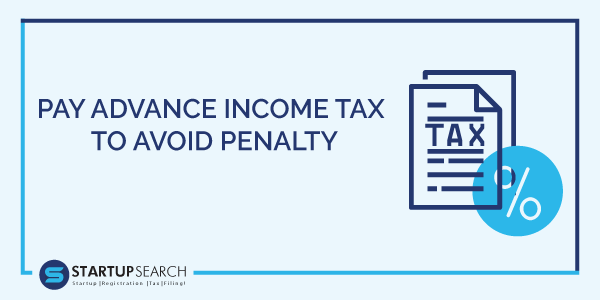PAY ADVANCE INCOME TAX TO AVOID PENALTY
By Taxpayer discharging their Income Tax liability, the government believes that they can simultaneously earn and pay tax. This can be done by two modes i.e collection and deduction of tax at source in most cases like salary, interest, rental, brokerage, commission, and professional fees.
Taxpayers who have not fully covered under TDS or TCS, they have to discharge their net tax liability by paying advance tax.
What is advance tax?
If you are tax liability is more than Rs. 10,000 then, you have to pay advance tax. Advance Tax applies to all taxpayers who are salaried, freelancer, and business.
Who has to pay advance tax?
After deducting the TDS amount, if your tax liability exceeds Rs.10,000 in a year, then you are liable to pay advance tax. Earlier individuals were required to pay advance tax in three installments on 15th September, 15th December, and on 15th March of the financial year in the ratio of 30%, 30%, and 40% respectively. The amended law, you have to pay the advance tax in four installments namely 15th June, 15th September, 15th December and 15th March in the ratio of 15%, 30%, 30%, and 25% respectively on these dates.
People who are engaged in any business and opted for paying tax on assumed profit @ 8% on their gross turnover up to Rs. 2 Crore, then they can pay the whole of their advance tax by 15th March and need not pay three earlier installments.
If they fail to pay it by 15th March and pay it after 15th March but before 31st March they will have to pay interest @ 1% for one month. In case you fail to pay advance tax or there is a shortfall in advance tax paid by you, you can still pay the advance tax by 31st March of the same financial year, and the same is treated as advance tax.

For any shortfall or default in payment of advance tax, you can make good the default or deficit in subsequent installments. For each delay in paying advance tax, you have to pay interest calculated @ 1% per month. But since the next installment becomes due only after three months, you effectively pay interest for three months even if there is a delay of one day beyond the due date.
According to the Covid-19 relief measures, if this first installment of advance tax is paid by June 30, 2020, instead of June 15, 2020, then the interest on delayed payment will be levied at 0.75 percent per month instead of 1 percent per month.
In case you are a senior citizen, the income tax law has a soft corner for you and exempts you from payment of advance tax even if your net tax liability exceeds Rs. 10,000/- for the year. However, this exemption is not applicable in case you have any income from a business or a profession. This exemption is not available even if you have losses from business or profession.
Consequences if the advance tax liability is not discharged by 31st March of the financial year
If you are not able to pay the advance tax before the end of the financial year or there is a shortfall in your advance tax payment, all is not lost. The tax liability can still be discharged but with a cost. The same can be discharged after the year-end but the payment gets another nomenclature, it is called self-assessment tax and not advance tax.
The interest for such default is calculated @ 1% for month or part of the month from 1st April of the following year till you actually pay the self-assessment tax. However in case, the shortfall in payment of advance tax against your net tax liability is not more than 10% of your overall tax liability, no interest is payable. In addition to the interest for non-payment of advance tax, the interest @ 1% for three months is anyway payable in addition to what you pay with self-assessment tax as explained above.
It is important to bring understand that that in case of default of shortfall in payment of advance tax, in addition to interest @ 1% till the date of actual payment of self-assessment tax, you may also have to pay penal interest for delay in filing of your income tax returns beyond the due date which is generally 31st July for salaried and most of the taxpayers. This interest is payable for the period beginning from the due date of filing of your return and ending with the actual date of filing of the return even in cases where you have already paid the self-assessment tax by the due date of filing of the income tax return.
So get ready to pay your installments of advance tax. Remember the second installment will fall due on 15th September.




